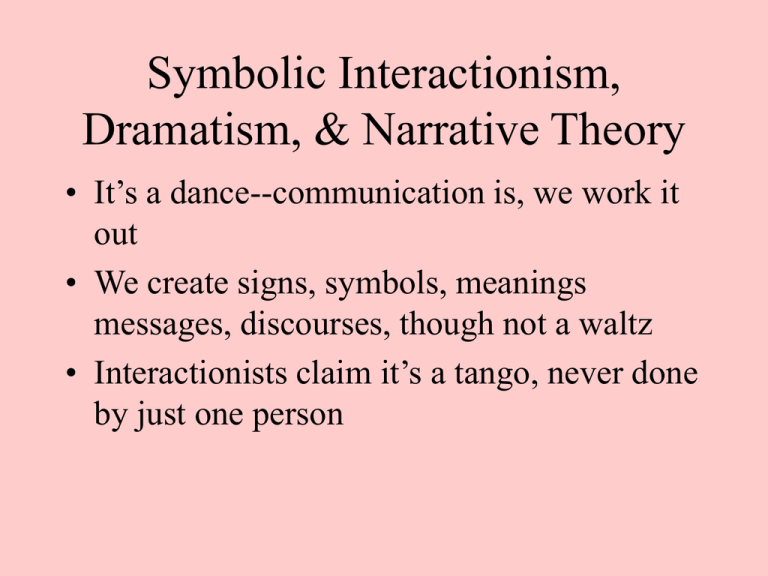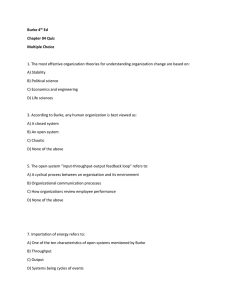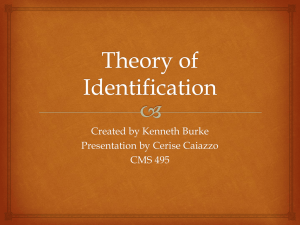Symbolic Interactionism, Dramatism, & Narrative Theory
advertisement

Symbolic Interactionism, Dramatism, & Narrative Theory • It’s a dance--communication is, we work it out • We create signs, symbols, meanings messages, discourses, though not a waltz • Interactionists claim it’s a tango, never done by just one person More Introduction • There’s structure, but it’s dam building or barn raising • It’s on the job or at the party’s bunch bowl that communication is constructed. Messages and even meanings are constructed • Past theories had a strong psychologically bases. • These have a sociologically bases. Even More Introduction • Watch Children at play--they create all sorts of symbols, meaning games, dances • Dramatististic/Narrative approaches claim that interactionism produces dramas/stories. • Key theorists: Bormann, Burke, Fisher The Assumptions of the Symbolic Interactionists • Human understanding is achieved by assigning meaning to experience. • Meanings are learned in interactions. – e.g. Texas 55 • All social structures and institutions are created by interaction between individuals. – e.g. MSU-Billings More on Assumptions • Social realities are created and recreated by interaction – Burkes stove • Mind is a mirror of interaction between persons. – Thoughts reflect life in society or your looking at your/our mind More on Assumptions • Behavior is enacted in the social group through interaction. (Created during experience) – ex. Acting out or “alone I would never . . .” • Behavior can only be understood by ascertaining the individual’s meanings for the behavior and the meaning is in the symbolic interaction mirror, thus motive So . . . • Follows nicely from systems theory • Families and stories – Religion and my family • Marketing • Chaining, Fantasy Themes, Rhetorical Visions • Cultures First Ernest Bormann • Convergence Theory • Studied Group Communication--Bales and Yale U. ‘72 • “Then one day while looking at coherence in groups . . .” More on Bormann • Chaining • Peoples visions of reality formed by stories created interaction • Fantasy Themes are stories told in small groups • Fantasy Themes get chained out in society Fantasy Themes • Cheyenne Chronicle – Manifest Destiny • Your best friends • Mayoral Elections – e.g. Cragan and Shields • Sonja and the ERA Bormann Applied • Marketing or how to make money with Bormann • The Iowa Firm Kenneth Burke • The Unending Conversation • A little background and some fun Burke’s Ideas • Wide ranging powerful theory of symbols and interaction • Distinguishes action (purposeful or choice) from motion or non-purposeful communication e.g. animals • Action involves symbol use • Reality is mediated through symbols and their meanings More • Symbols expiate guilt • Guilt is caused by the negative or the proscriptive nature of language • Guilt is caused by the perception of imperfection or the perfection principle • Perfection is also caused by social hierarchy • It leads to mystification More on Burke • Major function of communication is to rid ourselves of guilt • Communication involves consubstantiality or sharing of substance • Communication and persuasion are increased when identification results between people More on Burke • Three kinds of identification – Material--objects ex. fishing – Idealistic--ideas ex. Religion – Formal--forms of communication e.g. novels And More on Burke • Communication can also result in division or separation between people • Mystification occurs when one identifies with a charismatic person much higher in the hierarchy • Strategies are used to achieve identification or division Even More on Burke • Actions using symbols results in drama • To analysis dramas he uses the pentad – – – – Act=what is done Agent=who done it Scene=where it was done Agency=vehicle through which the act is accomplished – Purpose= reason for the act Lets do one . . . • I kings 3:16 “The Wise King” – – – – – Act? Agent? Scene? Agency? Purpose? Weighing Ratios • Which of the elements is dominant? • Compare and contrast through a calculus • So, which element is dominant? Now for a Philosophy • Corresponding philosophic terminology – – – – – Act=realism Agent=idealism Scene=materialism Agency=pragmaticism Purpose=mysticism What about you and me? • Would you analysis your own communication? • How could you? Fisher • Homo Narran • All rationality is based on narrative • Persuasion is based on the acceptance of good reasons • Two Criteria for judging stories – Coherence--Holds together – Fidelity--Rings true Let’s tell a story • Once upon a time . . .

